Here’s a pet peeve when reading a serious novel: the story goes into great detail on the woodgrain of the furniture, the clothing brands the characters wear, what music is playing in the background. But step outside, and birds appear that would not be found within 1,500 miles of the novel’s location.
Serious fiction has become inextricably associated with urbanity. And many novelists seemingly don’t even try to get nature right.
But there are fictions writers out there who write well, and passionately, about the natural world. Sometimes, we’d argue, their stories capture the essence of a place better than any non-fiction work ever could.
So here are eight of our favorites. Many of them are written by novelists who are also scientists or science writers, and they all get the details of wildlife and wild places right. We hope you enjoy them, and welcome your own picks in the comments section.
-
The Road
By Cormac McCarthy
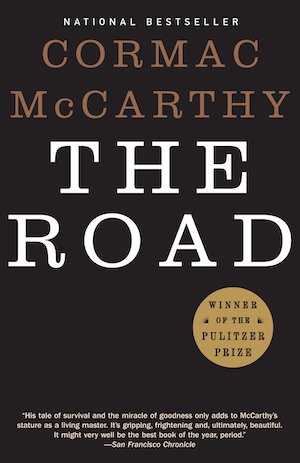
A Pulitzer Prize winner, The Road tells the story of a father and son making their way across a United States now devoid of life, save for scattered bands of other people. Some of whom are cannibals.
Yeah, it’s bleak. But as with other McCarthy novels, the landscape plays a central role, and a yearning for nature – now lost – fills its pages. I used a passage as the epigraph for my own book on fishing; it’s one of the best descriptions of wild brook trout and the places they live. McCarthy gets his details right. He doesn’t waste a word. It is not surprising that he is now coaching scientists on how to write better journal articles. (MM)
-
The White Bone
By Barbara Gowdy
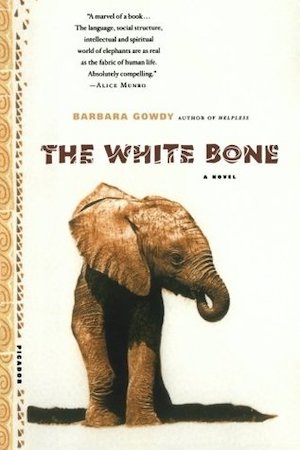
Mud and her elephant herd wander through a drought-stricken landscape, past the mutilated bodies of their kind. The rains are late, the dry land unfamiliar, and even memory itself begins to disintegrate. They search for the white bone, a mythical sacred object that will guide the elephants to a safe place, where water flows and the poachers cannot reach them.
Written from the perspective of a young female elephant, The White Bone is a masterpiece of imagination and cross-species empathy. Barbara Gowdy offers a window into the pain, suffering, and cultural collapse that African elephants are currently experiencing. The story may be fiction, but the heartbreak is real. (JEH)
-
The Breeding Season
By Amanda Neihaus
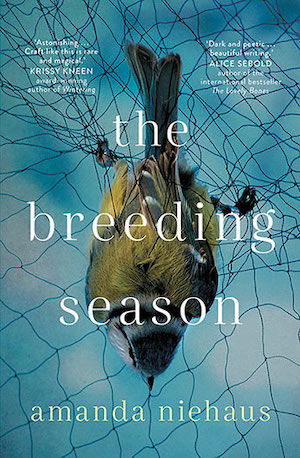
This story follows an Australian couple, Elise and Dan, as they attempt to reconnect in the wake of their baby’s death. Elise, an ecologist, punishes herself with grueling fieldwork trapping small mammals. Dan, a writer, grapples with his literary legacy and family trauma.
Though the obvious tragedy has already passed, another storm builds in the distance as the novel unfolds. Neihaus’s writing balances on the knife-edge between prose and poetry, with small phrases so beautiful that they catch you off-guard.
Though a work of fiction, her writing is founded in science. Neihaus is a trained ecologist who studies the reproduction of northern quolls, small Australian marsupials who quite literally copulate themselves to death. But she’s also a passionate science communicator who wants to reach a wider audience and use fiction to explore the intersection between sex and death, between art and science, and the complex power of human love. The result is dark, raw, and stunning. (JEH)
-
When the Killing’s Done
By TC Boyle
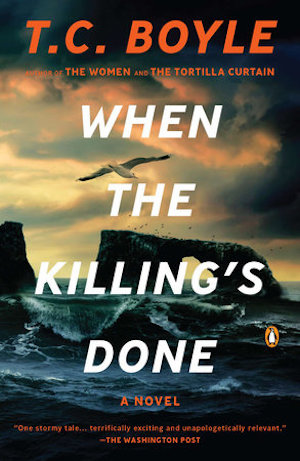
This novel is based loosely (very loosely) on a real conservation project in which The Nature Conservancy played a role: the removal of invasive pigs from California’s Channel Islands to allow the recovery of native wildlife. The plot centers on a national park biologist committed to recovering endemic island foxes and an animal rightist who wants to stop the killing of pigs at any cost.
The removal of invasive mammals often ignites passions and politics, and it provides rich grounds for a novelist of T.C. Boyle’s skill. He amps up the drama and violence, but also deftly shows the competing worldviews about the natural world and what species belong there. Fox biologists, pig killers, pig savers, ranchers and more converge in a tale of human values. Boyle raises often-difficult questions about the definition of “invasive” species. Many decisions are often based more on human values than on science. But the philosophy is just the background for a thrilling novel involving over-the-top personalities. (MM)
-
The Overstory
By Richard Powers
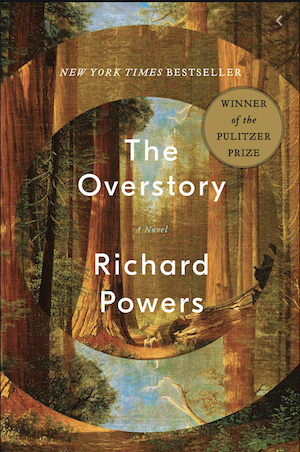
This Pulitzer-winning novel tells the story of nine strangers — connected by the power of trees — who join across time and space to fight against an environmental catastrophe.
An artist inherits a hundred years of portraits of the same American chestnut. A scientist with a hearing disability discovers that trees communicate with one another. A soldier fighting in the Vietnam War is saved when he falls from his aircraft into the bows of a banyan tree. A computer programmer sees a relationship between the genetic sequences of trees and his programming code.
Powers weaves together their stories — and the stories of the trees — across history and landscape, “in concentric rings of interlocking fables.” He manages to write about environmental catastrophe without veering into the gratuitously dystopian, and the novel is packed full of fascinating information about trees. (JEH)
-
Where the Crawdads Sing
By Delia Owens
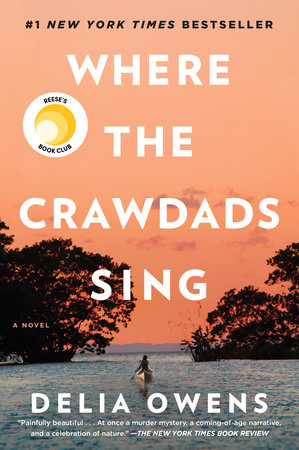
I’ve reviewed this book previously. But it’s worth mentioning again, because it’s a great novel that’s filled with excellent nature writing. It begins with a young woman living a semi-feral existence in coastal North Carolina. There is murder and romance and vivid characters. But there’s also wildlife and ecology and nature observation. Field guide illustrations play a central role throughout the story.
I’m heartened to see this book dominating various bestseller lists for the past year. It deserves it. And Delia Owens is pitch perfect in both capturing the spirit of a “swamp girl” and detailing the natural world that informs this girl’s world. Owens is a wildlife biologist who spent years with her husband in a remote tent, where they studied lions in very trying conditions (as detailed in their excellent book, Cry of the Kalahari). If you love nature writing, or just a good mystery, you won’t want this one to end. (MM)
-
Tiger Country
By Stephen Bodio
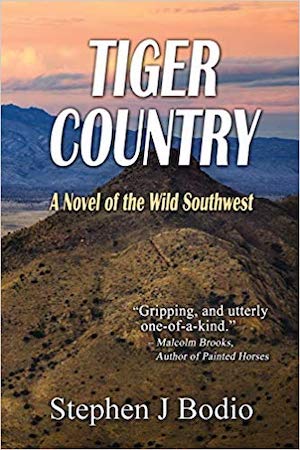
I read Stephen Bodio’s memoir Querencia more than 25 years ago. It was one of those books that expanded my world, with beautiful writing on topics that mattered to me. In my lifetime of book obsession, it remains my favorite. Bodio is known as a nature and outdoor writer, but he has read everything. His writing is informed by history, the classics, ranching culture, evolutionary biology and more.
In his first novel, he turns his attention to rewilding: the idea of bringing large predators back to landscapes where they’ve been eliminated. This is a love song to his beloved New Mexico, and involves a covert and illegal operation to bring back grizzly bears, jaguars and other large beasts to the Southwest. This is one of the more unusual takes on rewilding I’ve read (and I’ve read just about everything printed on the topic). There are not easy heroes or villains. There are stunning animals, domestic and wild. The protagonists eat and drink and discuss art and shoot things. The writing takes my breath away. Read this, then read everything else Bodio has written. (MM)
-
Go Down, Moses
By William Faulkner
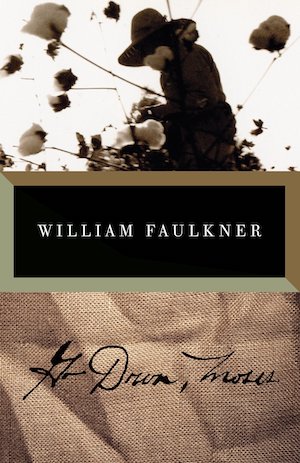
Yes, Faulkner.
Years ago, one of us spent an inordinate amount of time in college studying how classic southern writers incorporate nature into their stories. Faulkner is a master — weaving the southern landscape into his prose to the point that the land takes on a primal energy of its own, alongside the hunters and dogs that move through the gloomy woods and impenetrable stands of sugarcane.
If you read Faulkner in school and felt intimidated or overwhelmed, don’t worry. Go Down, Moses is less of a novel and more a collection of intertwined short stories. It’s still Faulkner, but it’s manageable. Fans of this book should also check out Faulkner’s Big Woods, another short story collection with more hunting stories. (JEH)
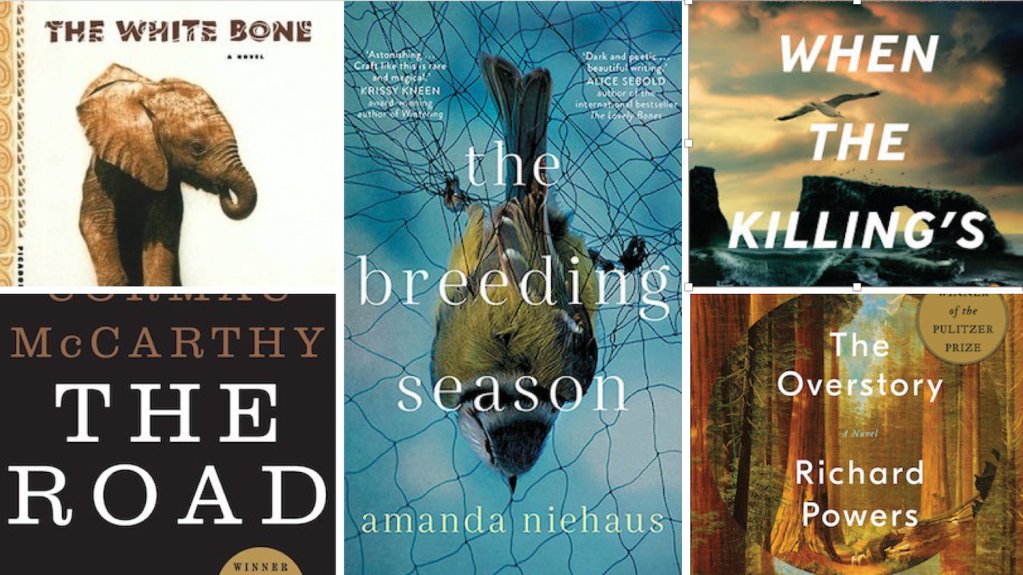



Prodigal Summer (or anything by Barbara Kingsolver)
Yes, McCarthy is bleak, but have spent a lot of time in the land he writes about, and he does a good job of making it real. Will read a couple of your suggestions as they are unfamiliar to me.
Thank you for these fascinating reviews! I plan to read several of them, especially the Faulkner. Haven’t read Faulkner in many years, these sound good for renewing my acquaintance with him.
Any Barbara Kingsolver novel!
‘Eucalyptus’ by Murray Bail. A medieval quest story set in modern Australia, that is a tribute to all Eucalypts.
Barbara Kingslover’s novels. She is from Kentucky – a biologist.
Great post! It really made me think and take note of my own favorites-whether the nature described was in the background or forefront of the tale-accuracy and detail of surroundings make such a difference and add to that fulfilled feeling I get at the end of a good book! Three favorites where nature was at the forefront and was so perfectly detailed I felt as if I could see, hear, and smell everything the authors described, were The Voyage of the Turtle, The Hidden Life of Trees, and Braiding Sweetgrass. All three authors have mastered imagery and storytelling in a way that make you feel as if you’re sitting on their back porch listening to them recount their lives and ruminations about topics very diverse from each other, but near and dear to my heart! If you haven’t read them, check them out!
Here’s a few more:
Signature of All Things by Elizabeth Gilbert
Flight Behavior by Barbara Kingsolver
Greenwood by Michael Christie
The Trees by Ali Shaw
Braiding Sweetgrass by Robin Wall Kimmerer (non-fiction but full of stories)
Great suggestions. Thanks for sharing.
Matt
Great suggestions! Some of these are waiting patiently on my “books to read” list – Justine
Last summer, I read a series of books written by Paul Doiran. The main character is a game warden named Mike Bowditch. The stories take place in Maine, and the author includes enjoyable descriptions of nature in his settings. The first book in the series is The Poacher’s Son. The series was among my favorite mysteries.
Hi Diane,
Thanks for writing. I am a fan of Paul Doiron’s mysteries, too. In fact, I wrote about the Mike Bowditch series in a blog about mystery novels for nature lovers: https://blog.nature.org/2019/04/01/mystery-novel-picks-for-nature-lovers/
If you like Doiron’s novels, you may also enjoy the others I mention.
Matt
I suggest books by the following authors:
– Edward Abbey
-Tony Hillerman
-Jim Harrison
-Randy Wayne White ( his Doc Ford novels)
-Carl Hiaasen (yes, they are slapstick, but still have an appreciation for the natural environment!)
Thanks!
Hi Gary,
Thanks for your suggestions. I have read all these authors and have enjoyed their work. Great picks!
Matt
Thanks for your piece – all of these books are going on my night table!!!
My suggestion is ‘Lab Girl‘ by Hope Jahren. Amazing writing that fires you up about plants, the wonders of botany, and the excitement of being a scientist. A memoir rather than a novel, but a great story.
Erin,
Thanks for writing and for your suggestion. I have not read Lab Girl yet but have heard several recommendations. I will check it out! Cheers, Matt
You missed all of Barbara Kingsolver’s novels!
Corinda,
We simply didn’t have space for all the great novels with nature in them, but you are right, Barbara Kingsolver deserves to have at least a novel on this list. Thanks for writing. Matt
Jim Harrison’s novels all deserve consideration, as he gets his natural history right, but “True North” may capture best the full essence of place, both in the tragic destruction of it by humans and the redemption it still provides. Set in Michigan’s Upper Peninsula, the protagonist struggles to come to terms with his family’s legacy of despoilment even as he seeks solace, love (with women and a dog), and truth in the North Woods. A minor character in the story shows up in a subsequent novel “Returning to the Earth” that provides insight into Native American attitudes towards nature while addressing the theme of death. The human relationship to nature is complex and troubled and Harrison explains well both the good and the bad.
Hi Tom,
Thanks for writing. I am a big fan of Jim Harrison and I had several of his novels for consideration on this list. We just didn’t have space for all our favorites. I will definitely include him on a future list. I love his non-fiction, too. Matt